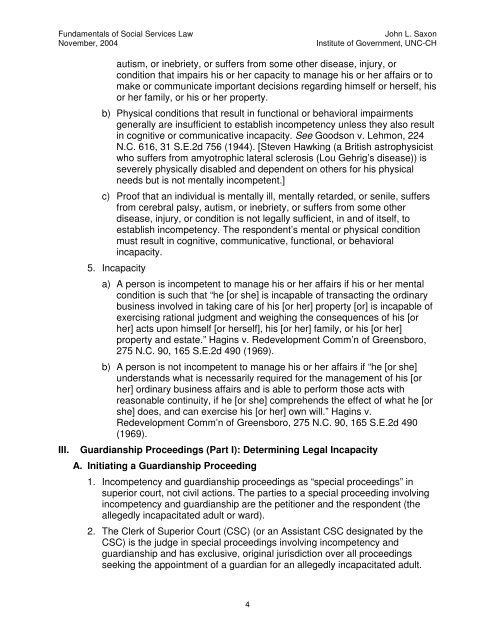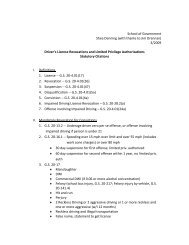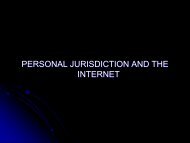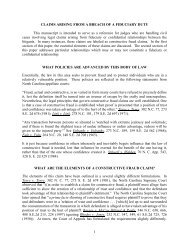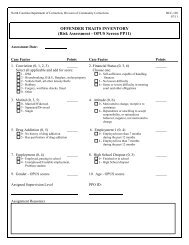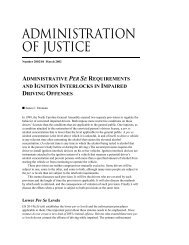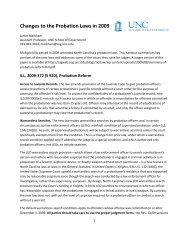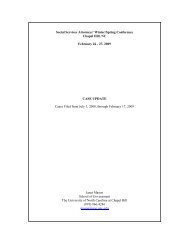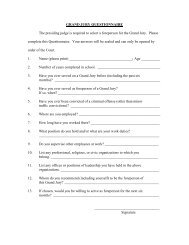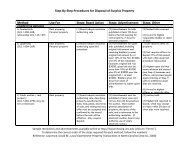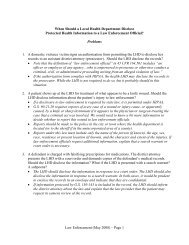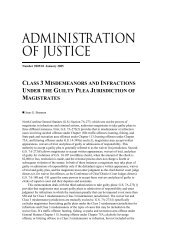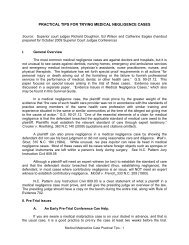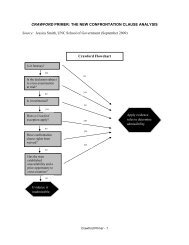Guardianship of Incapacitated Adults: A Summary of North Carolina ...
Guardianship of Incapacitated Adults: A Summary of North Carolina ...
Guardianship of Incapacitated Adults: A Summary of North Carolina ...
You also want an ePaper? Increase the reach of your titles
YUMPU automatically turns print PDFs into web optimized ePapers that Google loves.
Fundamentals <strong>of</strong> Social Services Law<br />
November, 2004<br />
John L. Saxon<br />
Institute <strong>of</strong> Government, UNC-CH<br />
III.<br />
autism, or inebriety, or suffers from some other disease, injury, or<br />
condition that impairs his or her capacity to manage his or her affairs or to<br />
make or communicate important decisions regarding himself or herself, his<br />
or her family, or his or her property.<br />
b) Physical conditions that result in functional or behavioral impairments<br />
generally are insufficient to establish incompetency unless they also result<br />
in cognitive or communicative incapacity. See Goodson v. Lehmon, 224<br />
N.C. 616, 31 S.E.2d 756 (1944). [Steven Hawking (a British astrophysicist<br />
who suffers from amyotrophic lateral sclerosis (Lou Gehrig’s disease)) is<br />
severely physically disabled and dependent on others for his physical<br />
needs but is not mentally incompetent.]<br />
c) Pro<strong>of</strong> that an individual is mentally ill, mentally retarded, or senile, suffers<br />
from cerebral palsy, autism, or inebriety, or suffers from some other<br />
disease, injury, or condition is not legally sufficient, in and <strong>of</strong> itself, to<br />
establish incompetency. The respondent’s mental or physical condition<br />
must result in cognitive, communicative, functional, or behavioral<br />
incapacity.<br />
5. Incapacity<br />
a) A person is incompetent to manage his or her affairs if his or her mental<br />
condition is such that “he [or she] is incapable <strong>of</strong> transacting the ordinary<br />
business involved in taking care <strong>of</strong> his [or her] property [or] is incapable <strong>of</strong><br />
exercising rational judgment and weighing the consequences <strong>of</strong> his [or<br />
her] acts upon himself [or herself], his [or her] family, or his [or her]<br />
property and estate.” Hagins v. Redevelopment Comm’n <strong>of</strong> Greensboro,<br />
275 N.C. 90, 165 S.E.2d 490 (1969).<br />
b) A person is not incompetent to manage his or her affairs if “he [or she]<br />
understands what is necessarily required for the management <strong>of</strong> his [or<br />
her] ordinary business affairs and is able to perform those acts with<br />
reasonable continuity, if he [or she] comprehends the effect <strong>of</strong> what he [or<br />
she] does, and can exercise his [or her] own will.” Hagins v.<br />
Redevelopment Comm’n <strong>of</strong> Greensboro, 275 N.C. 90, 165 S.E.2d 490<br />
(1969).<br />
<strong>Guardianship</strong> Proceedings (Part I): Determining Legal Incapacity<br />
A. Initiating a <strong>Guardianship</strong> Proceeding<br />
1. Incompetency and guardianship proceedings as “special proceedings” in<br />
superior court, not civil actions. The parties to a special proceeding involving<br />
incompetency and guardianship are the petitioner and the respondent (the<br />
allegedly incapacitated adult or ward).<br />
2. The Clerk <strong>of</strong> Superior Court (CSC) (or an Assistant CSC designated by the<br />
CSC) is the judge in special proceedings involving incompetency and<br />
guardianship and has exclusive, original jurisdiction over all proceedings<br />
seeking the appointment <strong>of</strong> a guardian for an allegedly incapacitated adult.<br />
4


